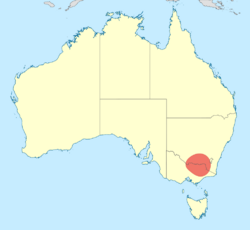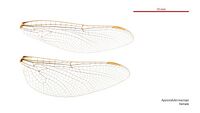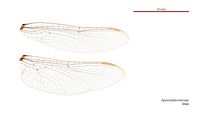Biology:Apocordulia
| Nighthawk | |
|---|---|
| Scientific classification | |
| Kingdom: | Animalia |
| Phylum: | Arthropoda |
| Class: | Insecta |
| Order: | Odonata |
| Infraorder: | Anisoptera |
| Family: | Austrocorduliidae |
| Genus: | Apocordulia Watson, 1980[1] |
| Species: | A. macrops
|
| Binomial name | |
| Apocordulia macrops Watson, 1980[1]
| |

| |
Apocordulia is a genus of dragonflies in the family Austrocorduliidae,[2] endemic to the Murray-Darling Basin in eastern Australia .[3]
Apocordulia is a monotypic genus with only one species, Apocordulia macrops,[4][5] commonly known as a nighthawk.[3] Apocordulia macrops is a medium-sized, dull coloured dragonfly with large eyes.[3] It inhabits inland rivers [6] and flies at dawn and dusk.[7]
Etymology
The word Apocordulia is derived from two words: apo from the Greek ἀπό meaning from or away, and Cordulia the genus of dragonfly. Tony Watson described the dragonfly genus Apocordulia as appearing different to the normal appearance of a Cordulia dragonfly.[1][8]
The species name macrops is derived from two Greek words makros (μακρός) meaning long, and ops (ὤψ) meaning eye, describing the long eye seam.[1][8]
Gallery
-
Female Apocordulia macrops wings
-
Male Apocordulia macrops wings
Note about family
There are differing views as to the family that Apocordulia best belongs to:
- It is considered to be part of the family Austrocorduliidae at the Australian Faunal Directory[2]
- It is considered to be part of the family Synthemistidae in the World Odonata List at the Slater Museum of Natural History[4]
- It is considered to be part of the family Corduliidae at Wikispecies
See also
- List of Odonata species of Australia
References
| Wikimedia Commons has media related to Apocordulia. |
- ↑ 1.0 1.1 1.2 1.3 Watson, J.A.L. (1980). "Apocordulia macrops, a new crepuscular gomphomacromiine dragonfly from south-eastern Australia (Odonata: Corduliidae)". Journal of the Australian Entomological Society 19 (4): 287–292 [287]. doi:10.1111/j.1440-6055.1980.tb00988.x.
- ↑ 2.0 2.1 "Genus Apocordulia Watson, 1980". Australian Biological Resources Study. 2012. https://biodiversity.org.au/afd/taxa/Apocordulia.
- ↑ 3.0 3.1 3.2 Theischinger, Günther; Hawking, John (2006). The Complete Field Guide to Dragonflies of Australia. Collingwood, Victoria, Australia: CSIRO Publishing. pp. 228. ISBN 978-0-64309-073-6.
- ↑ 4.0 4.1 "World Odonata List". University of Puget Sound. https://www.pugetsound.edu/academics/academic-resources/slater-museum/biodiversity-resources/dragonflies/world-odonata-list2/.
- ↑ "Species Apocordulia macrops Watson, 1980". Australian Biological Resources Study. 2012. https://biodiversity.org.au/afd/taxa/Apocordulia_macrops.
- ↑ Theischinger, Gunther; Endersby, Ian (2009). Identification Guide to the Australian Odonata. Department of Environment, Climate Change and Water NSW. pp. 241. ISBN 978-1-74232-475-3. http://www.environment.nsw.gov.au/resources/publications/09730AustOdonata.pdf.
- ↑ Watson, J.A.L.; Theischinger, G.; Abbey, H.M. (1991). The Australian Dragonflies: A Guide to the Identification, Distributions and Habitats of Australian Odonata. Melbourne: CSIRO. ISBN 0643051368.
- ↑ 8.0 8.1 Endersby, I. (2012). "Watson and Theischinger: the etymology of the dragonfly (Insecta: Odonata) names which they published". Journal and Proceedings of the Royal Society of New South Wales 145 (443 & 444): 34–53. ISSN 0035-9173. https://www.biodiversitylibrary.org/page/46371075.
Wikidata ☰ Q13430238 entry
 |


